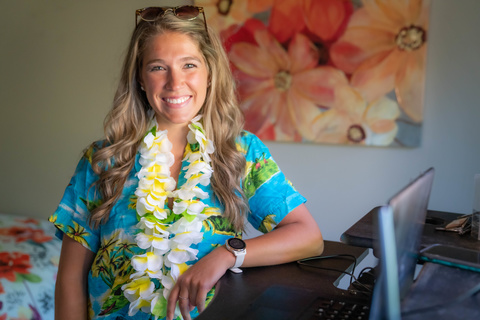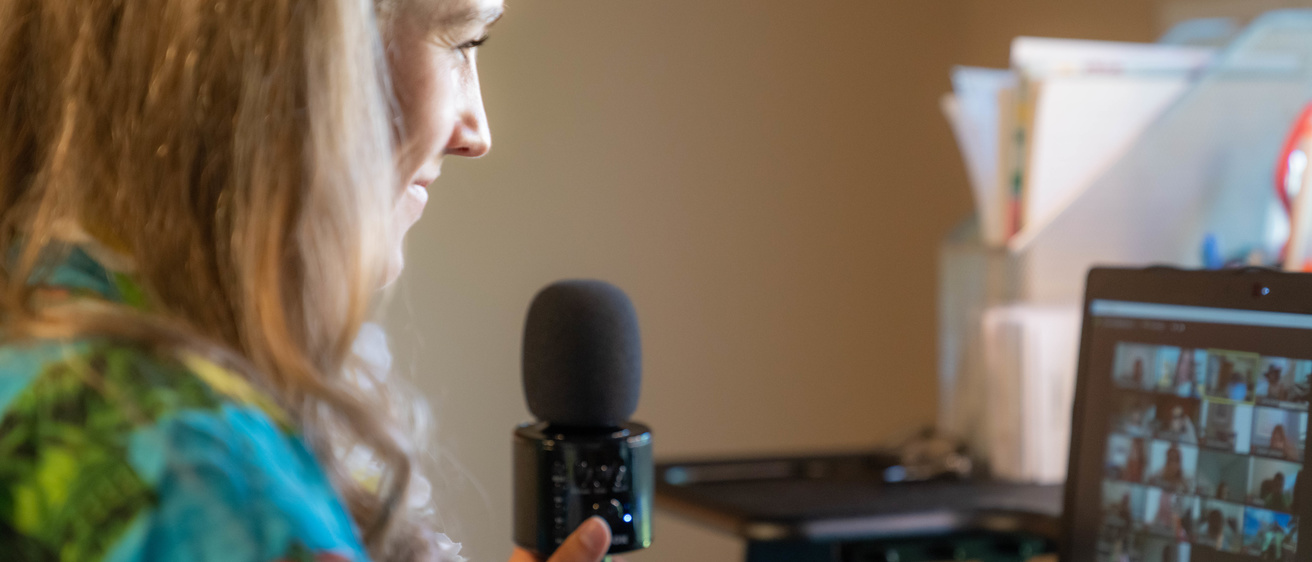Sydney Roper was heartbroken after she didn’t get to say goodbye to her first class when the school year ended early due to COVID-19.

Roper graduated from the University of Iowa College of Education in 2019 with her Bachelor of Arts in Elementary Education. After growing up with a mother who was an elementary school teacher, she had an undeniable passion for education.
“Growing up, I was either playing school with all of her supplies or spending time in her classroom, and I always loved it,” says Roper. “I tried to convince myself out of it for a while, but the passion was always there so I came to the College of Education, and I’ve never looked back. I couldn’t imagine doing anything else.”
For the past two years, Roper has been a second-grade teacher at Borlaug Elementary School in Coralville, Iowa. After COVID ended her first year as a teacher early, she became an online-only teacher last fall.
Initially, Roper struggled with the shift to online education.
“The lack of social interaction for me and my kids has been a challenge. One of the biggest things I love about teaching is the interactions and the relationships I build with my kids, and while we’ve built wonderful relationships online, it is really challenging not to be able to hug the kids in the morning when they come in or do fun games together in person,” says Roper.
Eventually Roper began to flourish as an online teacher, and she has grown in her teaching skills. She worked with her district over the summer to create all the online math curricula for the district and has been working with the online program task force looking towards this next academic year.
“I ended up finding my groove and the beauty of online learning and loved it. When people say online learning is a lost cause, it’s hard to hear because I’ve had so much growth and so many kids have flourished,” says Roper. “I’ve found a lot of beauty and positives in doing online teaching and have really enjoyed it.”
While Roper has found her love for online teaching, it is not without her challenges, she says.
One of these challenges is figuring out the technology aspect for her second-graders.
“I really had to get to know their computer. With second graders, there are a lot of kids that are struggling with different things and don’t exactly know how to read some of the things that are on their screen so a lot of times I would have to walk them through where the arrows are and what words they are looking for,” Roper says. “I don’t have the ability to just say go get mom and go get dad because they are working or they aren’t there. I’ve had to get to know their computers. I’ve been very impressed with their ability to follow directions.”
She says the social-emotional aspect of education has also been challenging for both her and her students.
“School is a safe place. When that got cut off quickly, I struggled with it because I knew a lot of my kids were missing that safe place. When they come to school and walk into my classroom, they know that it is a safe space, and we love each other and you are welcome here,” says Roper. “With being online, it allowed me to truly see into their homes and know what is going on there. Not being able to give them a breather from certain circumstances at home was hard for me.”
Roper says that she was able to find ways to provide that emotional support and safety for students online.
“I learned how to do it in a different way, whether it was having a kid stay behind for a chat or having a social emotional check in before every subject. That way I get to see their face, the sad face, the smiley face, it allows me to check. I’ve had to learn different ways to check in with them socially and emotionally,” says Roper.
Roper says having an insight into her students’ home lives during online learning has helped her grow with her concept of white privilege and equity.
“I am white, and I am privileged. I grew up in a family where I was fortunate to have a lot of different things, so I can’t say that I understand what some of my kids are going through, “ says Roper, “but I think having that look into their home will help me be a better teacher and help me understand a little bit more where a lot of the kids are coming from.”
Roper says that the pandemic has shown a brighter light on the importance of teachers, as many families struggled with having to go to their jobs while their kids stayed at home learning.
“It’s shown why school is so important so we have a spot for these kids. If the teachers don’t show up and the school isn’t open, a lot of things can’t run in the world,” says Roper.
